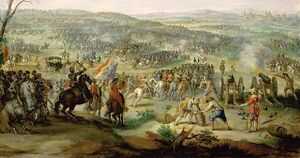Many thanks to our Patrons who cover ~2/3 of our hosting bill. Please join them if you can.
1620
Jump to navigation
Jump to search
1610 < 1611 < 1612 < 1613 < 1614 < 1615 < 1616 <1617 < 1618 < 1619 < 1620 > 1621 > 1622 > 1623 > 1624 > 1625 > 1626 > 1627 > 1628 > 1629 > 1630
 | |
| Year 1620 |
Contents
Events
January–June
- February 4 – Prince Bethlen Gabor signs a peace treaty with Ferdinand II, Holy Roman Emperor.
- June 3 – The oldest stone church in French North America, Notre-Dame-des-Anges, is begun at Quebec City, Canada.
July–December
- July 3
- Under the terms of the Treaty of Ulm, the Protestant Union declares neutrality and ceases to support Frederick V of Bohemia.
- Captain Andrew Shilling, on behalf of the English Honourable East India Company, lays claim to Table Bay in Africa.[1]
- July 25 (July 15 OS) – The armed merchant ship Mayflower embarks about 65 emigrants for New England at or near her home port of Rotherhithe on the Thames east of London; about July 29 (July 19 OS) she anchors in Southampton Water.[2]
- August 1 (July 22 OS) – The ship Speedwell departs Delfshaven with English separatist Puritans from Leiden bound to rendezvous with the Mayflower; on August 5 (July 26 OS) she anchors in Southampton Water.[2]
- August 15 (probable date; August 5 OS) – Mayflower and Speedwell depart together from Southampton,[2] but are forced to put back into Dartmouth, Devon, for repairs to a leak in the latter ship on August 22 or 23 (August 12 or 13 OS).
- August 7
- The mother of Johannes Kepler is arrested for witchcraft.
- Battle of Les Ponts-de-Cé, Poitou: French king Louis XIII defeats his mother Marie de' Medici.[3]
- September 2 (August 23 OS) – Mayflower and Speedwell depart together from Dartmouth; they are well out into the Atlantic when the Speedwell is again found to be leaking.[2]
- September 7 (August 28 OS)
- September 16 (September 6 OS) – Mayflower departs from Plymouth in England on her third attempt to cross the Atlantic.[4] The Pilgrims on board comprise 41 "saints" (English separatists largely from Holland), 40 "strangers" (largely secular planters from London), 23 servants and hired workers, together with c. 30 crew.
- September 17–October 7 – Battle of Cecora: The Ottoman Empire defeats Polish–Lithuanian Commonwealth–Moldavian troops.
- October 6 – Battle of Amedamit in Gojjam, Ethiopia: The Roman Catholic Ras Sela Kristos, half-brother of Emperor Susenyos, crushes a group of rebels, who were opposed to Susenyos' pro-Catholic beliefs.
- November 3 – The Great Patent is granted to Plymouth Colony.
- November 8 – Thirty Years' War: Battle of White Mountain – Catholic forces are victorious in only two hours near Prague.[5]
- November 21 (November 11 OS) – The Mayflower arrives inside the tip of Cape Cod (named from the Concord voyage of 1602), at what becomes known as Provincetown Harbor, with the Pilgrims and Planters; 41 Plymouth Colony settlers sign the Mayflower Compact, the first governing document of the colony, on board the ship.
- November 25 – The Wedding of Gustav II Adolf and Maria Eleonora takes place.
- December 21 – Plymouth Colony: William Bradford and the Mayflower Pilgrims land on what becomes known as Plymouth Rock, in Plymouth, Massachusetts.
Date unknown
- A severe frost in England freezes the River Thames; 13 continuous days of snow blanket Scotland. On Eskdale Moor, only 35 of a flock of 20,000 sheep survive.
- Witch-hunts begin in Scotland.
- History of submarines: Cornelis Drebbel demonstrates the first navigable undersea boat in the Thames in England.
- The modern violin is developed.
- Juan Pablo Bonet, teacher of deaf children in the Spanish court, creates a sign alphabet.
- Francis Bacon publishes the Novum Organum (beyond Aristotle's Organon) on logical thinking.
- A Short Account of the Destruction of the Indies by Bartolomé de las Casas and Origin and progress of the disturbances in the Netherlands by Johannes Gysius is re-published in the Netherlands.[6]
- Shōgun Tokugawa Hidetada restores Osaka Castle. Its modern-day appearance dates from this remodeling.
Ongoing
- The Thirty Years' War (1618–1648) continues (principally on the territory of modern-day Germany).
Births
January–March
- January 1
- William Brouncker, 2nd Viscount Brouncker of England (d. 1684)
- Robert Morison, Scottish botanist and taxonomist (d. 1683)
- January 5 – Miklós Zrínyi, Croatian military commander (d. 1664)
- January 9 – Anton Günther I, Count of Schwarzburg-Sondershausen (d. 1666)
- January 17 – Anton Janson, Dutch type founder and printer (d. 1687)
- January 31 – Prince Georg Friedrich of Waldeck, Dutch general and German field marshal (d. 1692)
- February 1 – Gustaf Bonde, Swedish politician (d. 1667)
- February 3 – Sir James Clavering, 1st Baronet, English landowner (d. 1702)
- February 5 – Paul Barbette, Dutch physician (d. 1666)
- February 13 – Girolamo Casanata, Italian cardinal (d. 1700)
- February 15 – François Charpentier, French archaeologist and man of letters (d. 1702)
- February 16 – Frederick William, Elector of Brandenburg (d. 1688)
- February 23 – Francis Newport, 1st Earl of Bradford, English politician (d. 1708)
- March 10 – Johann Heinrich Hottinger, Swiss philologist and theologian (d. 1667)
- March 13 – Alexander Seton, 1st Viscount of Kingston (d. 1691)
- March 29 – Edward Digges, English barrister and colonist, Colonial Governor of Virginia (d. 1674)
April–June
- April 4 – Bernardino León de la Rocha, Roman Catholic prelate, Bishop of Coria and of Tui (1669–1673) (d. 1675)
- April 15 – Edward Villiers, English politician and military officer (d. 1689)
- April 17 – Marguerite Bourgeoys, French Catholic nun, founder of the Congregation of Notre Dame (d. 1700)
- April 18 – Winston Churchill (1620–1688), English noble, soldier (d. 1688)
- April 21 – Salvatore Castiglione, Italian painter (d. 1676)
- April 24 – John Graunt, English demographer (d. 1674)
- May 3 – Bogusław Radziwiłł, Polish-Lithuanian noble (d. 1669)
- May 21 – Krsto Zmajević, Montenegrin-born Venetian merchant (d. 1688)
- May 23 – Pieter Neefs the Younger, Flemish painter (d. 1675)
- May 25 – Warwick Mohun, 2nd Baron Mohun of Okehampton, English Member of Parliament (d. 1665)
- June 6 – Sir John Covert, 1st Baronet, English politician (d. 1679)
- June 11 – John Moore (Lord Mayor), Member of Parliament for the City of London (d. 1702)
July–September
- July 21 – Jean Picard, French astronomer and priest (d. 1682)
- July 31 – Juan Ignacio de la Carrera Yturgoyen, Chilean politician (d. 1682)
- August 6 – William Hiseland, English (later British) soldier, reputed supercentenarian (d. 1732)
- August 19 – Johann Just Winckelmann, German writer and historian (d. 1699)
- August 22 – Alexander Rigby (died 1694), English politician (d. 1694)
- August 24 – Thomas Stucley (MP), English politician (d. 1663)
- August 26 – Ernst Bogislaw von Croÿ, German Lutheran administrator (d. 1684)
- September 4 – Ernest Gottlieb, Prince of Anhalt-Plötzkau (d. 1654)
- September 6 – Isabella Leonarda, Italian composer (d. 1704)
- September 18 – Albert II, Margrave of Brandenburg-Ansbach, German prince (d. 1667)
- September 25 – François Bernier, French physician and traveller (d. 1688)
- September 29 – John Louis of Elderen, Bishop of Liege (d. 1694)
October–December
- October 1 – Nicolaes Pieterszoon Berchem, Dutch Golden Age painter of pastoral landscapes (d. 1683)
- October 4 – François-Henri Salomon de Virelade, French lawyer (d. 1670)
- October 15 – William Borlase (died 1665), English politician (d. 1665)
- October 16 – Pierre Paul Puget, French painter (d. 1694)
- October 20 – Aelbert Cuyp, Dutch painter (d. 1691)
- October 27 – Philip Louis, Duke of Schleswig-Holstein-Sonderburg-Wiesenburg (d. 1689)
- November 10
- Ninon de l'Enclos, French author (d. 1705)[7]
- Theodoor Boeyermans, Flemish Baroque painter (d. 1678)
- Template:Circa November 20 – Peregrine White, first child born to English settlers at Plymouth Colony (d. 1704)
- December 17
- Henri Charles de La Trémoille, son of Henry de La Trémoille (d. 1672)
- Maurice of the Palatinate, 4th son of Frederick V, Elector Palatine (d. 1652)
- December 18 – Heinrich Roth, German Jesuit missionary, pioneering Sanskrit scholar (d. 1668)
- December 23 – Johann Jakob Wepfer, Swiss pathologist (d. 1695)
- probable – Ecaterina Cercheza, princess consort of Moldavia (d. 1666)[8]
Deaths
January–March
- January 23 – John Croke, English politician and judge (b. 1553)
- January 26 – Amar Singh I, ruler of Mewar (b. 1559)
- January 28 – Archduchess Eleanor of Austria (b. 1582)
- February 15 – James Archer, Irish Jesuit; played a controversial role in the Nine Years' War (b. 1550)
- February 19
- Al-Mansur al-Qasim, Imam of Yemen (b. 1559)
- Roemer Visscher, Dutch writer (b. 1547)
- February 23 – Nicholas Fuller, English politician (b. 1543)
- March 1 – Thomas Campion, English poet and composer (b. 1567)[9]
- March 5 – Giovanni Francesco Sagredo, Italian mathematician (b. 1571)
- March 17 – St. John Sarkander, Moravian priest (injuries caused by torturing) (b. 1576)
- March 25 – Johannes Nucius, German composer (b. c. 1556)
- March 29 – Hachisuka Yoshishige, Japanese daimyō of the Edo period (b. 1586)
April–June
- April 8 – Angelo Rocca, Italian humanist (b. 1545)
- April 23 – Hayyim ben Joseph Vital, Palestinian-born Kabbalist (b. 1543)
- April 14 – Rascas de Bagarris, French scholar (b. 1562)
- May 16 – William Adams, English navigator and samurai (b. 1564)[10]
- May 30 – Mathias Hovius, Roman Catholic archbishop (b. 1542)
- June 17 – Mikołaj Zebrzydowski (b. 1553)
July–September
- July 13 – William Louis, Count of Nassau-Dillenburg (b. 1560)
- August 2 – Carolus Luython, Belgian composer (b. 1557)
- August 14 – Katherine Hastings, Countess of Huntingdon, wife of Henry Hastings, 3rd Earl of Huntingdon (b. 1540)
- August 18 – Wanli Emperor, of China (b. 1563)
- September 13 – Wolfgang Hirschbach, German legal scholar (b. 1570)
- September 26 – Taichang Emperor, fourteenth emperor of the Ming dynasty of China (b. 1582)
- September – Sidonia von Borcke, German noble and alleged witch (b. 1548)
October–December
- October 7 – Stanisław Żółkiewski, Polish nobleman of the Lubicz coat of arms (b. 1547)
- November 6 – Philip III, Margrave of Baden-Rodemachern (1588–1620) (b. 1567)
- November 7 – Robert Hesketh, English politician (b. 1560)
- November 9 – Louise de Coligny, daughter of Gaspard II de Coligny; fourth and last spouse of William the Silent (b. 1555)
- November 11 – Isaac and Josias Habrecht, Swiss watchmaking brothers (b. 1544)
- November 27 – Francis, Duke of Pomerania-Stettin, Bishop of Cammin (b. 1577)
- December 3 – Janusz Radziwiłł, Polish noble (b. 1579)
- December 21 – George Fleetwood, English politician (b. 1564)
Date unknown
- Rose of Turaida, legendary Latvian murder victim (b. 1601)
- John Flower, English politician (b. 1535)
Approximate date
- Brianda Pereira, Azorean Portuguese heroine (b. 1550)
- Isabella Parasole, Italian artist (b. ca. 1570)
A New Group
| Group | Image | Type | Description |
|---|---|---|---|
| Central University of Ecuador |  | National university | Most national politicians have studied or worked here |
Many thanks to our Patrons who cover ~2/3 of our hosting bill. Please join them if you can.
References
- ↑ https://books.google.com/books?id=ntsyoxWIB44C&q=east+india+company+1620+table+mountain
- ↑ Jump up to: a b c d e https://archive.org/details/mayflowerherlogj00ames
- ↑ https://books.google.com/books?id=lm4TAQAAIAA
- ↑ https://archive.org/details/cassellschronolo0000will
- ↑ https://books.google.com/books?id=RLtnAAAAMAAJ
- ↑ http://www.wdl.org/en/item/515/
- ↑ https://books.google.com/books?id=s4RUAAAAMAAJ
- ↑ http://atlas.usv.ro/www/codru_net/CC18/1/lilia.pdf
- ↑ https://www.britannica.com/biography/Thomas-Campion
- ↑ https://books.google.com/books?id=qZ9Kwt_N2ocC&pg=PA166